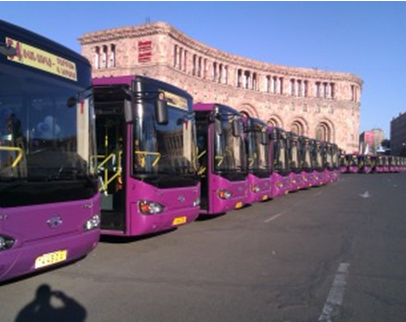

Armenia: Opportunities for UK economic engagement
The Armenian economy is sufficiently prosperous for there to be no need for traditional international bilateral aid from the UK. After the 1988 earthquake, the UK sent support and the Embassy and UK volunteers have made a real difference at the Lord Byron school at Gyumri, opened in 1990 by Margaret Thatcher during her first visit to the then Soviet Union. The Armenian diaspora is generous and a key source of foreign direct investment.
249 of the bright purple buses on the streets of Yerevan were gifts from the Chinese in 2012. Clearly marked “China Aid”, they are visible symbol of the strategic importance of Armenia at the crossroads between East and West, North and South. With the Russians pushing their Eurasian trade area and selling a range of goods and natural gas to the Armenians at attractive rates, Armenia is making the most of its ability to attract support from a range of other countries.
The Yerevan Metro has EU branding, probably because of EBRD loan financing. As at the time of writing, the EBRD has agreed further lending to improve the Yerevan metro and a grant from the European Union Neighbourhood Investment facility. There is an invitation to tender for tunnelling and other services.
The UK rightly considers Armenia to be a potential flash point for conflict, with its enmity towards its neighbours in Turkey and Azerbaijan and the frozen conflict in Nogorno-Karabakh. The UK’s Conflict Pool funds support a range of activities, described on the FCO website as “supporting diplomacy, encourage wider public debate, challenge stereotypes and raise awareness of the need for compromise to secure a negotiated settlement”.
The majority of UK funding goes to Armenia via the EU aid budget.
EU funding to Armenia has amounted to EUR197 million in the 2011-2013 period. According to the EU’s website, these funds are focused on:
- Democratic transition and good governance (including reforms of public administration, public finance, justice)
- Trade, investment and regulatory reforms
- Socio-economic reform, poverty reduction and sustainable development (including regional development, agriculture, education)
The feedback we received from some of the young, highly educated think-tankers we met with in Yerevan was that these funds have been used to draft and implement some beautifully crafted laws on paper, but that in reality they were not being implemented effectively if at all. One of the Armenian civil society activists said that we should stop funding the current Armenian government until it showed more respect for human rights, justice and the rule of law.
During our visit (on 17th February), the following call for expression of interest was issued by the EU Eastern partnership:
“The Regional Monitoring and Capacity Building Unit (RMCBU) of the Eastern Partnership Culture Programme launches a call for expressions of interest for participating in the Cultural Policy Exchange Workshop Cycle 2014 ‘Implementation Tools and Mechanisms for Policy Reforms’. During the three workshops participants will work on their policy or strategy concepts. As lasts year Workshop Cycle, the Workshop Cycle 2014 is dedicated to the elaboration of cultural strategies and policies and will deepen strategic thinking and approaches on strategy and policy development. In addition, the Workshop Cycle 2014 will include the elaboration of implementation plans for these strategy and policy concepts.”
If this is a typical example of the kind of project that UK taxpayers are currently funding via the EU aid budget, it would suggest that our money could be better spent.
The British Council in Yerevan is run by an impressive local team. The main annual event, other than the cycle of English teaching an exams, is the annual British Film Festival. It is very well attended and an excellent and fairly inexpensive way to transmit British culture to a large Armenian audience in several locations.






